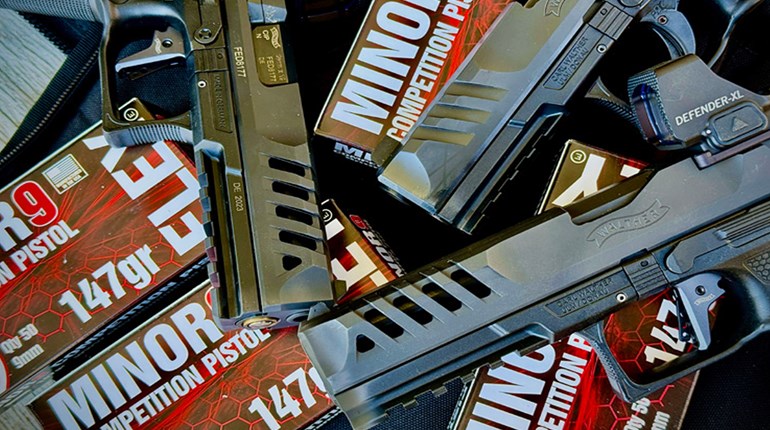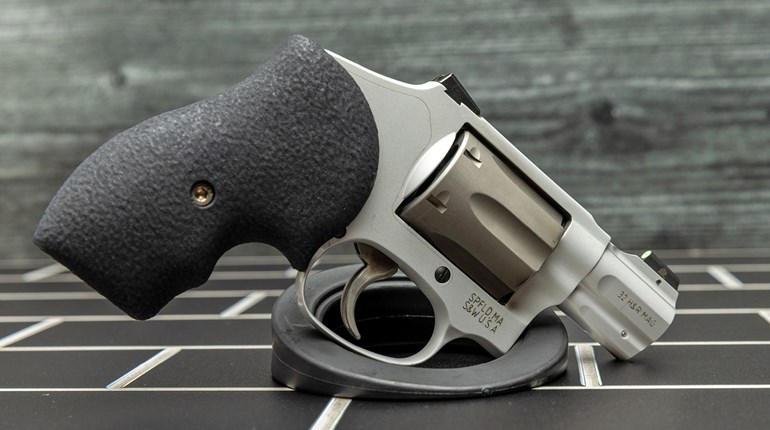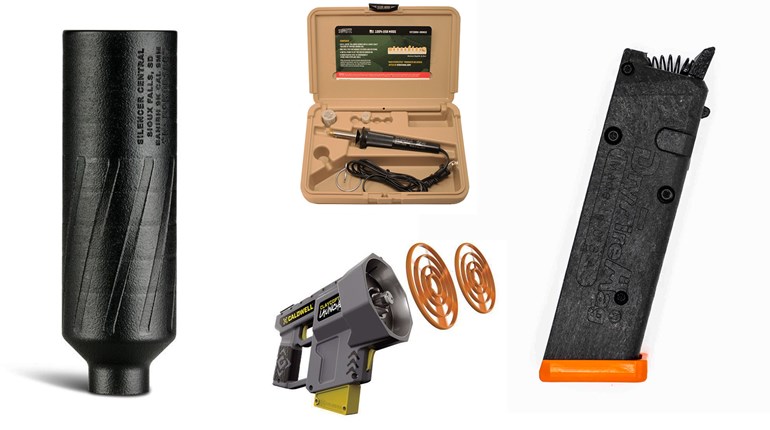Today, we’re focusing on the features of the hugely popular SIG Sauer P365. Why has this gun taken the concealed-carry market by storm and inspired competitors? We’ll find out. To really put the SIG Sauer P365 into perspective, I thought it’d be prudent to compare it to one of the benchmark guns in the CCW market: the Glock G43. I call the G43 a benchmark gun, because the ubiquitous nature of the Glock makes it a natural obstacle for any newcomer to the market, and successful designs have to prove themselves to a significant degree over what many consider to be a standard in the industry.
Size
When it first launched, SIG characterized its P365 as a “micro-compact,” and there’s no denying that the gun’s small size is one of its stand-out features. The overall length of the gun measures just over 5 and three-quarter inches long, 4 and a quarter inches high and 1 inch wide. Compare that to the Glock G43, which measures just over 6 inches long, 4 and a quarter inches high and slightly under 1 inch wide. Both are easily carried and easily concealed.
Capacity
In combination with its size, the capacity of the P365 is what really made it stand out. There have been many small, single-stack nines on the market for years, but the SIG changed the market, thanks to its unique, stagger-stack magazine design. Compared to the 6 rounds carried in the Glock G43, the SIG has 10 rounds on board in a flush-fit magazine, providing a 67-percent increase in on-board capacity for what’s virtually the same size gun. That’s pretty impressive.
What’s also impressive is that SIG has expanded-capacity, factory-made magazines for its P365, which allows owners to up magazine capacity to 12 or even 15 rounds. OEM magazines for the Glock G43 are only available in 6-round capacities, though there are aftermarket magazine extensions available.
Weight
Though the Glock G43 is a bit longer than the P365 and certainly has less carrying capacity, weight is where the G43 can claw back a small piece of ground. Unloaded, the Glock weighs 17.99 ounces with an unloaded magazine, whereas the SIG weighs 18.55 ounces with an unloaded magazine.
Of course, you’re not going to carry an unloaded gun, so what we really want to know is what these guns weigh when loaded up. That’s where the expanded capacity of the SIG P365 has consequences. Loaded up, the SIG weighs more than 23 ounces, while the Glock clocks in at just over 20.5 ounces. It doesn’t sound like much, but ounces start to count when you’re carrying a gun inside the waistband all day. It’s something to keep in mind.
Aftermarket Support
While SIG is certainly helping out the P365 with a few factory options, there’s no question that the Glock G43 owns the aftermarket. Magazine extensions abound for the Glock G43, as well as sights, barrels, slides, enhanced controls and trigger upgrades. However, it’s worth noting that the reason these aftermarket options exist for the Glock is that many consumers aren’t satisfied with the OEM components included on the G43 and seek out upgraded components. SIG arguably includes some of these upgraded components straight from the factory, since the P365 includes XRAY3 night sights and has a pretty decent OEM trigger. Of course, many people just like to tinker, too, and Glocks are much better-suited for that.
One element on the P365 that is worth noting is the accessory rail on the dustcover. This allows for the secure addition of some lights and lasers, like SIG’s FoxTrot365 weaponlight. However, the size of the P365 makes it too thin to accept standard Picatinny-rail attachments, so most of the lights and lasers on the market aren’t going to work. The Glock G43 doesn’t have any accessory-attachment provision at all. The only options for lights and lasers rely on clamps that wrap around the trigger guard.
Reliability
Both the G43 and the P365 have been out for a short time, relatively speaking. Glock introduced the G43 in 2015, and SIG launched the P365 at the 2018 SHOT Show. Glock, of course, has a long track record of reliability, and the G43 continues that tradition. SIG experienced some teething issues with early-production models of the P365, but as the company refined its production, those problems have disappeared. Of course, firearm reliability also relies on a few outside variables controlled by the shooter, such as maintenance, ammunition quality and shooting technique, but as far as OEM reliability, both the P365 and G43 are on equal footing.
Shootability
How a gun feels and how it shoots are both highly subjective elements, so there’s no way I can give you a definitive comparison on one versus the other. Objectively speaking, the SIG P365 does have a slightly wider frame, which means that there’s a bit more meat at the rear of the gun transferring recoil from each shot. This means that the SIG P365 could be conceived as having slightly less felt recoil, simply because of the wider backstrap. True, too, is the fact that, with more rounds on board, the P365 has more weight to counteract recoil. However, which gun shoots better is something you’ll need to decide for yourself. All that’s left is to get your hands on them and head to the range!
I Carry Spotlight: SIG Sauer P365 vs. Glock G43
Support NRA Shooting Illustrated
DONATE

























